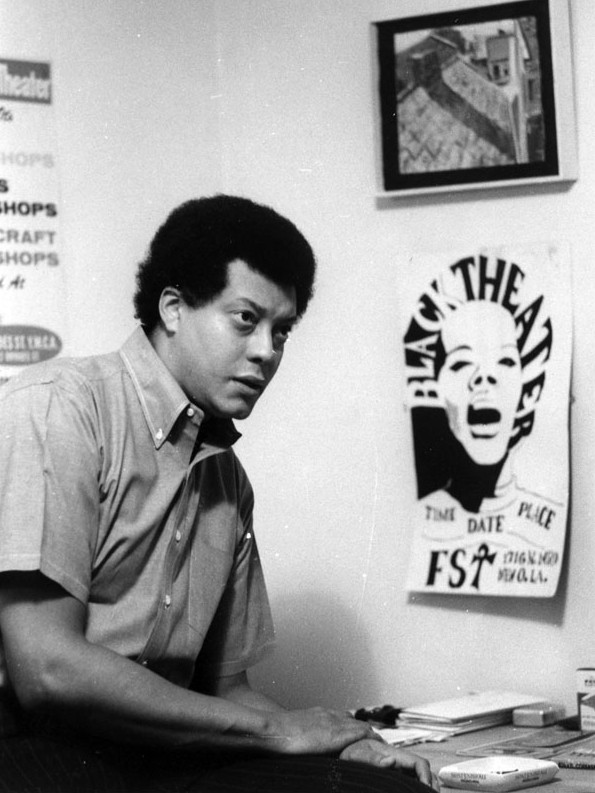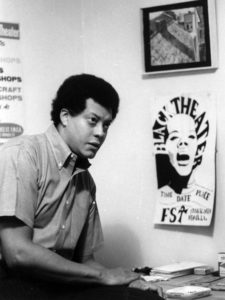BLKARTSOUTH
Established in 1968 by writers Tom Dent and Kalamu ya Salaam, BLKARTSOUTH was a community writing and acting workshop that provided a forum for emerging black poets and playwrights to develop and showcase their work.

Courtesy of Amistad Research Center at Tulane University.
A black and white reproduction of a photograph of Tom Dent with Free Southern Theater poster.
Writers Tom Dent and Kalamu ya Salaam (aka Val Ferdinand) established the group BLKARTSOUTH in 1968. A community writing and acting workshop, it grew out of the Free Southern Theater and provided a forum for emerging black poets and playwrights to develop and showcase their work. Members of BLKARTSOUTH performed poetry and short plays throughout the South, though the organization was based in New Orleans. Like the Free Southern Theater, BLKARTSOUTH represented a southern extension of the contemporary Black Arts Movement, encouraging self-awareness, pride, and political action among African Americans.
Origins of BLKARTSOUTH
BLKARTSOUTH began as a nameless community poetry and writing workshop of the Free Southern Theater, an organization that aimed to bring theater to African American audiences throughout the South. Theater leaders, led by writers Tom Dent and Kalamu ya Salaam, hoped the workshop would serve as an incubator for the development of new African American writers. The group’s emphasis on poetry and prose writing also complemented the playwrights’ workshop already in operation.
While still in its infancy, BLKARTSOUTH began organizing performances of its members’ original poetry and other creative works. Venues ranged from university auditoriums to community centers to the annual meetings of organizations such as the Southern Christian Leadership Conference. Though based in New Orleans, BLKARTSOUTH sponsored performances in Waveland, Mississippi, Charleston, South Carolina, and Baton Rouge, among other places. Audience interactivity was encouraged at performances, though viewers were sometimes shocked at the subject matter. The poetry and dramatic works often addressed issues such as human sexuality, race relations, politics, and violence, and were frequently imbued with profanity. Much of the creative output of BLKARTSOUTH went undocumented since many group members viewed poetry as a primarily oral, rather than written, art form.
Nkombo and Nkombo Publications
By 1968 BLKARTSOUTH was publishing an occasional journal of poetry and other creative writing. Originally entitled Echoes from the Gumbo, the journal soon changed names to Nkombo, the Bantu word that is the origin of the English “gumbo.” The journal provided a forum for the creative output of Free Southern Theater’s workshops participants and, more generally, of writers throughout the South. Edited variously by Tom Dent, Kalamu ya Salaam, and Wendell Narcisse, Nkombo published only nine issues between 1968 to 1974. Its short life, however, does not diminish its significance as one of the South’s most important contributions to the Black Arts Movement.
In addition to the journal, Nkombo Publications—the publishing arm of BLKARTSOUTH—produced several chapbooks and smaller works of fiction and collected writings. It was widely influenced by the broader Black Arts Movement, and figures of national prominence lent their voice to BLKARTSOUTH’s various publications. In the inaugural issue of Echoes from the Gumbo, for example, Maulana Ron Karenga speaks to the transformative potential of literature with an assertive tone that characterizes much of the movement’s writing: “We must make warriors out of our poets and writers. For if all our writers would speak as warriors our battle would be half won. Literature conditions the mind and the battle for the mind is the first half of the struggle.” In a later issue of Nkombo, Kalamu ya Salaam echoes Karenga, claiming that there is a sense of urgency in black art and that art itself can alter black consciousness: “blackart writing tho young must deal w/h what is now, must confront the problems of blk people & this is not easy/ we (NKOMBO) as blkwriters are & ought to be black warriors, & so for which reason every poem is maybe the last.…”
Despite the politically charged character of this passage, BLKARTSOUTH was less fragmented than many groups within the Black Arts Movement. Several issues of Nkombo highlighted the contributions of female writers, and Catholics worked alongside Muslims in the group. BLKARTSOUTH even bridged the generation gap. Octave Lilly – who was part of the Federal Writers’ Project in the 1930s and published in the journal Opportunity during the Harlem Renaissance – had his works featured in numerous volumes of Nkombo.
New Orleans Aesthetics
Drawing from local aesthetic traditions also made BLKARTSOUTH unique. Jazz, gumbo, local musicians, and the poverty of the Central City all made their way into the works of the BLKARTSOUTH writers. Writer David Henderson’s gritty poem “Charity Hospital” offers this example: “New O’s Charity (sic) Hospital is a model patch-up-the-crazy-niggers-and-get-them-back-in-the-streets institution. Peoples be walking in with knives stuck in they head, meat cleavers attached to they back, limbs falling off, beer and soda bottles ground into their skulls.…” Though the stylized African American syntax of Henderson’s poem is representative of Black Arts poetics, his reliance on local settings and landscapes is typical of BLKARTSOUTH poets. New Orleans aesthetics may have influenced the ideological formation of the group, as well. In a later interview with Tom Dent, Kalamu ya Salaam referred to the group’s “jazz paradigm for artistic development,” which emphasized “individual development within a collective context.”
Decline and Legacy
At its height, national publications such as Black Theatre and Black World/Negro Digest reported on the activities of BLKARTSOUTH. The group also influenced other community arts organizations such as Sudan Arts Southwest in Houston and the Theatre of Afro Arts in Miami. The final issue of Nkombo, published in June 1974, marked the end of BLKARTSOUTH, though the workshop left an indelible mark on arts in the South. Moreover, its members, especially Tom Dent, played a leading role in forming the Southern Black Cultural Alliance, a regional arts cooperative. Locally, the Congo Square Writers Union served as an heir to BLKARTSOUTH.
